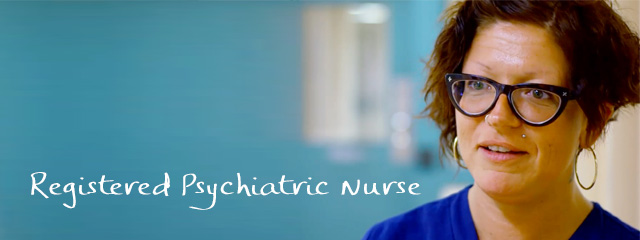

A psychiatric nurse’s unconventional career
Story by Laura Manuel
Sleeved in colourful tattoos and sporting a couple of piercings, Trish Dribnenki doesn’t fit the idea of a typical nurse. But then again, there’s nothing typical about her work or the variety of clients she cares for every day.
“I always wanted to work in jail,” Dribnenki says of her job as a registered psychiatric nurse (RPN) at the Calgary Remand Centre.
“Jail has a really interesting subculture. I learn so much from listening to inmates and other staff.”
Because most inmates suffer from mental illness and addictions, Dribnenki explains that ‘jail nursing’ is really a collaborative effort between health care and corrections staff.
“I've learned a lot from correctional officers,” says Dribnenki. “Sometimes they recognize declining mental health and/or substance issues before I do because of their experience.”
Working in a correctional facility also means treating and supporting inmates with chronic and acute illness, injuries from violence, and those who are pregnant. Dribnenki thrives on the variety, and it keeps her learning every day.
The diversity in her work also gives her experience and skills to work at her other jobs. On top of her role at the Calgary Remand Centre, she is a community health nurse, street nurse and inpatient/outpatient psychiatric nurse. She works out of mobile clinics, the Calgary Remand Centre, the Operational Stress Injury Clinic and with a harm reduction team.
According to Dribnenki, an RPN must be good at managing their time, be adaptable and be able to remain calm in stressful situations. Above all, Dribnenki needs to be creative.
“Mental illness does not look the same or act the same for every individual,” says Dribenki, “Sometimes you have to be creative in order to engage people.”
Dribnenki has organized anything from bingo groups to makeovers where clients would get their hair and make-up done. These activities help clients engage with others, open up, and have some fun.
She also says that treating all clients with empathy and respect is important in her profession.
“I have not met a client who said, ‘When I grew up, I wanted to struggle with mental health, homelessness, incarceration and addiction,’” says Dribnenki. “For many, there are a series of unfortunate life situations or choices; sometimes, without positive support systems.”
Depending on where Dribnenki is working, she will see anywhere from five to 15 clients a day. At the Calgary Remand Centre, she works with well over 15 clients a day.
She administers medications, teaches infection prevention and helps people learn to make safer choices. She will also treat wounds and infections. But mainly, Dribnenki spends a lot of her day simply listening, which she says is an essential skill for an RPN. “A lot of times, people just want to be heard or supported.”
Dribnenki believes that everyone has a story. And given the opportunity to share it, clients will reveal important information that can help staff provide better care.
RPNs who work with vulnerable populations face many challenges. Dribnenki often sees people who have difficulty navigating within or between support systems, and who have repeated struggles with mental health, addictions, relationships, homelessness and incarceration.
“Sometimes it's disheartening to watch them repeat choices that are unhelpful,” Dribnenki says. “You're rooting for them, but life can be very challenging.”
Because working with inmates or people on the street can be tough, Dribnenki has to be adaptable.
“I've been called names, been ignored, misunderstood, yelled at and made fun of,” says Dribnenki. But the rewards far outweigh the hard times.
“I try to remember the clients who have remembered my name, or remembered a time I spoke with them, or took care of them. Those are the most rewarding times for me, knowing that even for a little while, I might have helped someone laugh, learn, vent or feel safe.”
Dribnenki enjoys the unique role that RPNs fill within the health system. They help individuals with their physical ailments, and they help people make connections between their physical and mental health.
“Every day is different, a learning experience and a day that you can give someone the opportunity to feel better or help themselves. It's interesting to listen to a client’s strategies, humour and perspective. It can be humbling and I feel more enriched because of the things I have learned from my clients.”
Dribnenki recently was named Registered Psychiatric Nurse of the Year by the Alberta College of Registered Psychiatric Nurses. She is currently working on her bachelor of science degree in psychiatric nursing.
An RPN must have a diploma or degree from a psychiatric nursing program and be registered with the College Member of the College of Registered Psychiatric Nurses of Alberta (CRPNA).
Alberta Health Services employs approximately 790 registered psychiatric nurses.
For more about Trish Dribnenki, watch her video profile.